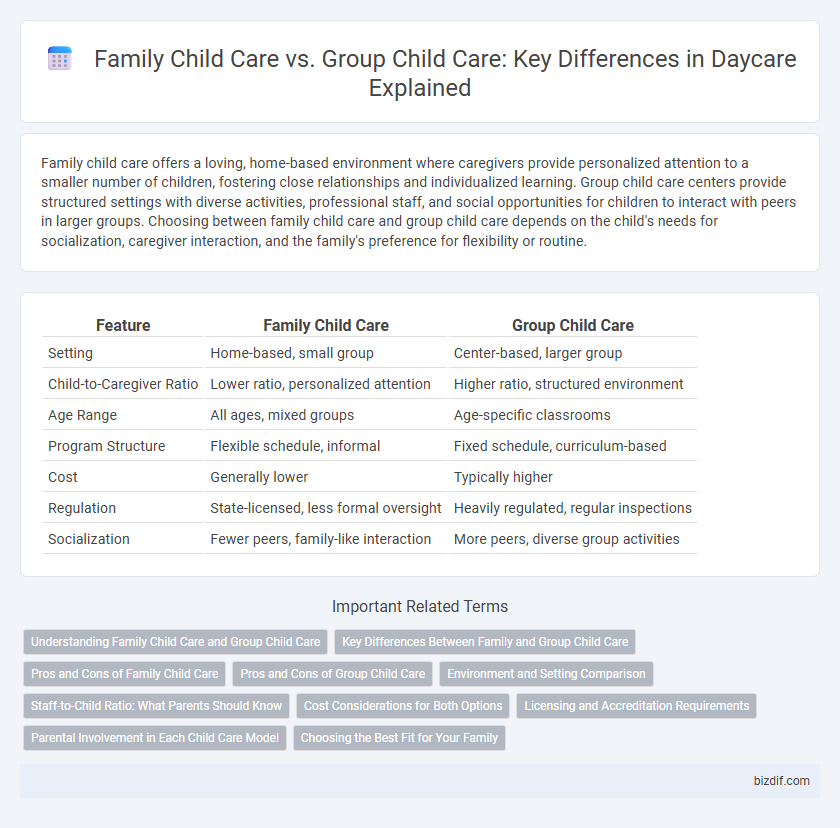Family child care offers a loving, home-based environment where caregivers provide personalized attention to a smaller number of children, fostering close relationships and individualized learning. Group child care centers provide structured settings with diverse activities, professional staff, and social opportunities for children to interact with peers in larger groups. Choosing between family child care and group child care depends on the child's needs for socialization, caregiver interaction, and the family's preference for flexibility or routine.
Table of Comparison
| Feature | Family Child Care | Group Child Care |
|---|---|---|
| Setting | Home-based, small group | Center-based, larger group |
| Child-to-Caregiver Ratio | Lower ratio, personalized attention | Higher ratio, structured environment |
| Age Range | All ages, mixed groups | Age-specific classrooms |
| Program Structure | Flexible schedule, informal | Fixed schedule, curriculum-based |
| Cost | Generally lower | Typically higher |
| Regulation | State-licensed, less formal oversight | Heavily regulated, regular inspections |
| Socialization | Fewer peers, family-like interaction | More peers, diverse group activities |
Understanding Family Child Care and Group Child Care
Family Child Care provides a home-based setting where caregivers typically look after a small group of children, fostering a personalized and family-like environment. Group Child Care centers, on the other hand, operate in larger facilities with multiple staff members, offering structured programs and educational activities for diverse age groups. Both options support early childhood development but differ in scale, social interaction opportunities, and caregiver-to-child ratios.
Key Differences Between Family and Group Child Care
Family child care operates in a caregiver's home, often serving a smaller group of children which allows for more personalized attention and a home-like environment. Group child care takes place in a dedicated facility with larger staff and more children, offering structured activities and resources geared toward early childhood development. Licensing requirements, caregiver-to-child ratios, and the scope of educational programs typically vary between the two, influencing cost, socialization opportunities, and regulatory standards.
Pros and Cons of Family Child Care
Family Child Care offers personalized attention due to smaller group sizes, fostering strong caregiver-child bonds and a home-like atmosphere that supports emotional development. However, it may lack the diverse social interactions found in Group Child Care and could have limited resources or facilities compared to larger centers. Parents often value Family Child Care for its flexibility and individualized care but must consider potential variations in regulation and caregiver qualifications.
Pros and Cons of Group Child Care
Group child care offers structured social interaction and access to professional educators, enhancing cognitive and social development for children aged 2 to 5 years. However, higher child-to-caregiver ratios may reduce individualized attention and increase exposure to illnesses compared to family child care settings. Facilities must meet state licensing standards, which ensure safety and curriculum quality but can result in higher operational costs reflected in fees for families.
Environment and Setting Comparison
Family child care operates in a home-based environment, providing a smaller, more intimate setting that fosters personalized attention and a family-like atmosphere. Group child care centers offer larger, structured facilities designed to accommodate more children with multiple caregivers, promoting social interaction and diverse learning activities. Both settings emphasize safety and development but differ in scale, with family child care focusing on a cozy, flexible environment and group child care prioritizing resources and organized programming.
Staff-to-Child Ratio: What Parents Should Know
Family child care typically offers a lower staff-to-child ratio, often with one caregiver responsible for a small group of children, fostering personalized attention and stronger caregiver-child bonds. In contrast, group child care centers maintain regulated ratios that vary by age group but involve multiple staff members to manage larger groups, ensuring specialized supervision and diverse interactions. Parents should consider how these differences impact child safety, individual needs, and social development when choosing the ideal daycare setting.
Cost Considerations for Both Options
Family child care typically costs less per child compared to group child care due to smaller group sizes and home-based settings, resulting in lower overhead expenses. Group child care centers often have higher fees driven by larger staff requirements, facility maintenance, and regulatory compliance costs. Parents should evaluate their budgets alongside the quality of care and available subsidies when comparing these cost considerations.
Licensing and Accreditation Requirements
Family child care providers typically require state licensure and must comply with specific health, safety, and caregiver-to-child ratio standards, which vary by state. Group child care centers often face more stringent licensing requirements, including comprehensive staff background checks, higher caregiver-to-child ratio regulations, and mandatory accreditation from organizations such as the National Association for the Education of Young Children (NAEYC). Both settings benefit from accreditation, but group child care centers are more frequently held to rigorous standards to ensure quality and safety.
Parental Involvement in Each Child Care Model
Family child care typically allows for higher parental involvement through more personalized communication with caregivers, fostering close relationships and tailored care plans. Group child care often offers structured opportunities for parent engagement via scheduled meetings, organized events, and formal updates, but may limit individualized interaction due to larger child-to-caregiver ratios. Parents choosing family child care benefit from direct involvement in daily routines, while group child care supports involvement through community-building activities.
Choosing the Best Fit for Your Family
Family Child Care offers a personalized and home-like environment ideal for families seeking flexibility and individual attention for their child. Group Child Care centers provide structured programs with certified staff and socialization opportunities, suitable for families prioritizing diverse learning experiences and routine. Evaluating your child's temperament, family schedule, and educational goals helps determine the best fit between intimate care settings and larger childcare centers.
Family Child Care vs Group Child Care Infographic

 bizdif.com
bizdif.com